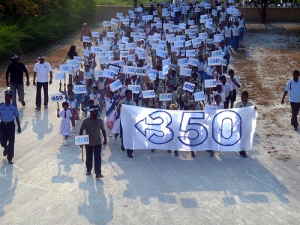Twenty-six year-old Dante Ryel of Waterloo, Ontario, has been fasting since March 3, ever since Canadian parliamentarians returned to work after an enforced prorogation holiday imposed by Prime Minister Stephen Harper. In taking this action, Ryel hopes to focus politicians’, and Canadians’, attention on Bill C-311, the Climate Accountability Act that is currently making its way through parliament. By fasting, Ryel is underscoring the importance of addressing climate change now, before millions of people across the world are put at risk of starvation due to changing climate conditions. Ryel’s Facebook page puts it this way:
Canada has an opportunity to take a historic leadership role in solving climate change. That’s why I, Dante Ryel, have been participating in a water-only fast from March 3rd, the Day parliament resumed, until I can be assured that Bill C-311 will become law. Bill C-311 is also known as the Climate Change Accountability Act. There is a huge difference between Stephen Harper’s made in USA, weak, greenhouse gas targets and the ambitious targets in Bill C-311. If we want to avoid a more than two degree increase in temperature, a climate change tipping point, then our M.P.s must vote for this historic Bill.
The NDP introduced Bill C-311 and the Bloc Quebecois will support it. We must pressure the leaders of the Liberal and Conservative parties to vote yes on Bill C-311. In fact, all we need is Liberal support! However, the Liberals have made no commitment and many people are scared that some in the party will vote no. We need to pressure them. Stephen Harper’s Conservatives have consistently voted against Bill C-311, and have prevented any meaningful progress on climate change, but we should still ask them for their support. You never know. The duration of my fast will be determined by the Liberals and/or the Conservatives because neither party has made a commitment to the bill.
We are so close to making history but we must make sure our politicians do the right thing!
Bill C-311’s preamble states that its purpose is to ensure that Canada assumes its responsibilities in preventing dangerous climate change, recognizing that:
Climate change poses a serious threat to the economic well-being, public health, natural resources and environment of Canada;
The impacts of climate change are already unfolding in Canada, particularly in the Arctic.
Scientific research on the impacts of climate change has led to broad agreement that an increase in the global average surface temperature of two degrees Celsius or more above the level prevailing at the start of the industrial period would constitute dangerous climate change.
Scientific research has also identified the atmospheric concentration levels at which greenhouse gases must be stabilized in order to stay within two degrees of global warming and thereby prevent dangerous climate change.
This legislation is intended to ensure that Canada reduces greenhouse gas emissions to an extent similar to that required by all industrialized countries in order to prevent dangerous climate change, in accordance with the scientific evidence on the impacts of increased levels of global average surface temperature and the corresponding levels of atmospheric concentrations of greenhouse gases.
Click here to send a letter (it’s all written and ready to go, you just have to fill in your own information and press “send letter”!) to all of the leaders in Ottawa, asking them to pass Bill c-311 now. It has already made it through two votes, and is expected to hit the floor of the House of Commons on March 31st where it could be debated for up to a month. If it passes in the House it then needs to pass in the Conservative-dominated Senate. Ryel comments that:
We need a senator to sponsor the bill otherwise it could take months to be voted on and if there’s an election the bill will be scrapped. However, I’m hoping that we can at least get the Mulroney-era Senators to vote for it and C-311 will become law. We must email our MPs/Senators to support Bill-C311.
Click here to get the contact information for Senators, and here for the Members of Parliament contact information.
To go to Ryel’s Facebook page, click here. You can view Dante’s first video explaining his initiative below, or go to his Youtube channel, Starving For Change, for more.
[youtube=http://www.youtube.com/watch?v=oL98shGhGyw&hl=en_US&fs=1&]


